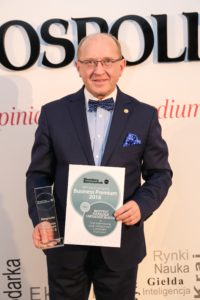On September 26, 2016, Bloomberg Businessweek Poland magazine awarded the Business Premium 2016 award for the services of outstanding quality, modernity and fit to market needs. Among the winners was the Institute of Physiology and Pathology of Hearing for 10 years of telemedical care of patients with different hearing implants.
 For the third time, Bloomberg Businessweek Poland magazine awarded the business services, taking into account their quality, adaptation to market needs, modernity, efficiency and anticipation of customers’ interests. Projects that have gained recognition are these which for years supported business as well as new, designed for demanding clients.
For the third time, Bloomberg Businessweek Poland magazine awarded the business services, taking into account their quality, adaptation to market needs, modernity, efficiency and anticipation of customers’ interests. Projects that have gained recognition are these which for years supported business as well as new, designed for demanding clients.
The Institute of Physiology and Pathology of Hearing received an award for 10 years of telemedical care of patients with different hearing implants. Institute of Physiology and Pathology of Hearing (IFPS) is the largest centre for otolaryngology in Poland, which performs most surgical procedures in the field of otolaryngology in the world. Specialists of the Institute carry out approx. 250,000 medical consultations and about 18,000 surgical procedures per year.
– In every action in the first place we put the welfare and needs of our patients. For many of our patients frequent visits to the Institute are associated with long trips and travel-related costs. To facilitate the process of treatment and rehabilitation, we used the Internet as a tool enabling remote medical consultations. That’s how the system allowed to create a network of medical centres co-operating with the Institute and one another – said during the Gala prof. dr hab. Henryk Skarżyński, director of the Institute of Physiology and Pathology of Hearing.
First research works and then clinical works related to telemedicine headed by professor Skarżyński’s team of engineers and specialists took place more than 15 years ago. First, they were concerned with tele-consultations carried out by professor Skarżyński. In 2005, the first attempts were undertaken on the remote setting of operation of hearing implants in selected, constantly growing group of patients with partial deafness. A new method of tele-fitting began gradually and on increasingly larger scale to be implemented in clinical practice. Finally, the world’s first National Teleaudiology Network was created – a system including, among others, tele-rehabilitation, tele-fitting, tele-education, screening, tele-diagnostics, not only in Poland but also in other countries in Europe, Asia and Africa.





